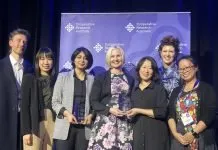Julianne Parkinson, the founding CEO of the Global Centre for Modern Ageing (GCMA), took the stage earlier today at the National Retirement Living Summit to address a pressing issue—how housing policies can be transformed to enhance well-being in later life. Ms Parkinson highlighted the GCMA’s contributions to global research on ageing in place and emphasised the pivotal role of housing in shaping policies for the elderly.
At the forefront of their efforts, the GCMA utilises living laboratory methodologies and a globally accredited studio for prototyping, empowering older individuals through their innovative co-design program. This program engages older adults in collaboration with property and product developers to design new and adapted built environments, products, and services that cater to their specific needs.
Ms Parkinson stressed that housing plays a central role in ageing policy, significantly impacting overall well-being and quality of life during later years. She emphasised that the home itself, as well as the quality of the neighbourhood and community, including both physical and social aspects, influence health and well-being. By adopting a holistic approach, it becomes crucial to create environments and deliver products and services that enable active ageing and foster meaningful social connections.
Ms Parkinson raised the topic of achieving the gold standard in “accessible” and “enabling” design. She urged developers of all types to redefine their strategies and embrace innovation to meet the evolving needs of older adults. Ms Parkinson highlighted the importance of addressing social connections and preventing isolation, particularly as many older people continue to work and require convenient access to co-working spaces as part of the “new future.”
Furthermore, Ms Parkinson discussed the increasing demand for designing integrated care hubs, high-care spaces, and specialised environments catering to specific needs such as dementia care, respite care, and palliative care. She emphasised the focus on hospitality and social connection within these environments and highlighted that not-for-profit organisations are adapting and aligning their services with the evolving preferences of the ageing population.
Ms Parkinson acknowledged that while starting from scratch offers relative ease, there are transformational possibilities in refurbishing existing structures. She emphasised that older dwellings, when thoughtfully updated, can still serve as valuable assets.
Underlined was the importance of considering diverse demographics, including CALD communities and First Nations perspectives, when building for a diverse demographic. Familiarity and acceptance of technology were also mentioned as key considerations compared to gated communities that have been more curated.
Highlighted, was the myriad of technologies already supporting older adults to age in place, including smart home devices, wearables, and telemedicine platforms. These technologies offer convenience, and safety, and promote proactive healthcare management.
“We are entering a new era of people’s expectations of how they want to live, and what spaces and offerings can be provided that meet those needs now and into the decades of life to come. It’s an opportunity to think, partner and create differently”.
Julianne Parkinson, CEO of the Global Centre for Modern Ageing (GCMA)
Ms Parkinson called for a comprehensive approach to ageing in place, emphasising that solely focusing on greenfield projects is insufficient. She predicted the emergence of new companies offering exceptional customer service and innovative solutions within the next five to seven years. She stressed the importance of guiding principles in informing new builds and remodelling/refurbishments that cater to buyers and renters of all ages.
Also highlighted in the presentation is the growing interest of older individuals in non-retirement village settings and the necessity of providing a wider range of living arrangement choices. She noted that aesthetics emerged as a critical factor, reflecting the more sophisticated cohort of older adults who no longer settle for generic and basic products.
Ms Parkinson stressed the transformative potential of technology in enabling convenient living options. She proposed the development of an independent testing and validation rating tool to identify and rate the usability of products, empowering decision-makers to make informed choices.
In her closing remarks, Ms Parkinson emphasised the urgent need for modern ageing and housing policy transformation. Insights into research, design, technology, and language underscored the importance of collaboration and innovation in meeting the diverse needs and aspirations of older adults in our rapidly changing world.










